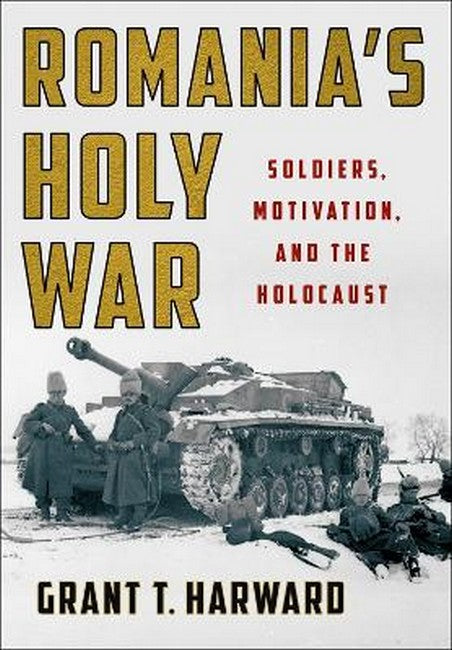Grant T. Harward is a US Army Medical Department Historian, a former Fulbright Scholar, and a former Research Fellow at the Mandel Center of the United States Holocaust Memorial Museum.
Request Academic Copy
Please copy the ISBN for submitting review copy form
Description
Introduction 1. Ideology of Holy War 2. Army Culture, Interwar Politics, and Neutrality 3. 1940-1941: From Neutral to Axis 4. 1941: Holy War and Holocaust 5. 1941-1942: Doubling Down on Holy War 6. 1942-1944: Holy War of Defense 7. Propaganda and Discipline 8. Women and Minorities Epilogue
Harward paints a particularly compelling picture of how events at the front line affected the treatment of Jews in occupied territory. Romania's Holy War, by combining military history with insight into the Romanian army's ideological motivation, is an important contribution to the field. (LA Review of Books) Harward's book is the first one in English to recount in such detail the role of the Romanian Army in the Eastern Campaign. Romania's Holy War deserves to be read not only by the relatively small number of experts dealing with these issues, but by a broader audience as well. (Israel Journal of Foreign Affairs) Harward's writing is clear, concise, and free of jargon. The book is well-researched, making use of archival materials few historians have accessed as well as interviews. Valuable for researchers, scholars, graduate students, and general readers. (Journal of Military History) Grant Harward's impressive debut monograph breaks important new ground by examining what motivated the conduct of Romanian army troops in this undertaking. Romania's Holy War is a valuable, pioneering and highly impressive addition to the literature. It successfully and innovatively integrates Holocaust history with an examination of Romanian troops' motives, and also benefits greatly from a highly engaging style and an effective use of visual sources. (Second World War Research Group) Romania's Holy War presents an engaging overview of the Romanian army from its origins through World War II, including a useful sketch of its operational history. It's a stimulating and welcome addition to the scant body of English-language historiography on Hitler's Axis partners in Europe. (Michigan War Studies Review) Grant Harward's monograph offers a provocative and detailed narrative that aims to correct misrepresentations of the actions undertaken by the Romanian army during World War II vis-a-vis the Jewish population they encountered. The book is an impressive synthesis of the Romanian army's actions toward the Jewish communities they encountered from Iasi to Odessa and beyond. The evidence presented by the author leaves no doubt that antisemitism was a mainstream attitude in the army and that antisemitic propaganda was replete in the army. As such, the book is a welcome addition to the growing literature on this topic. (Austrian History Yearbook) This is an important work for scholars on both the Second World War and the Holocaust. Based on rich archival holdings, oral interviews with veterans, contemporary periodicals and extensive printed primary research, Grant Harward's study demonstrates Romanian commitment to the Axis. (Journal of European Studies) Grant T. Harward compellingly and convincingly shows that the Romanian army was a conscious and dedicated partner of Germany in their joint campaign against the Soviet state. The four pillars of the Romanian officers' and soldiers' unwavering commitment to the dictator Ion Antonescu's 'holy war' were nationalism, religion, antisemitism, and anticommunism. (Journal of Modern History)

